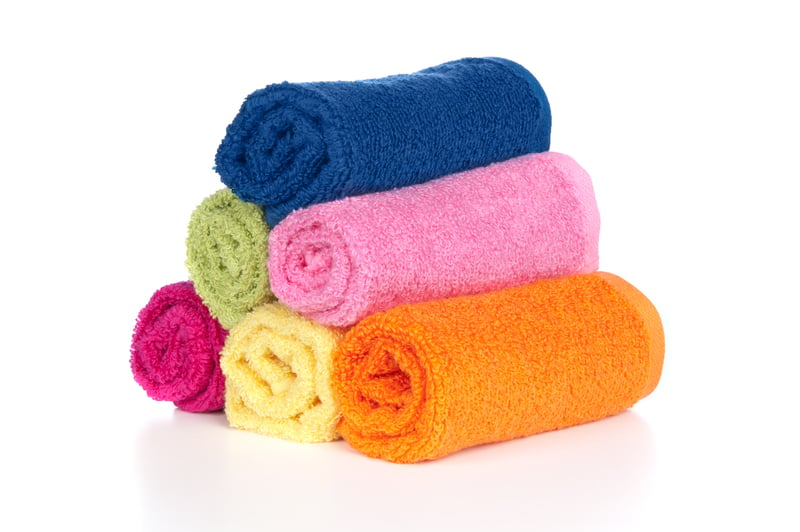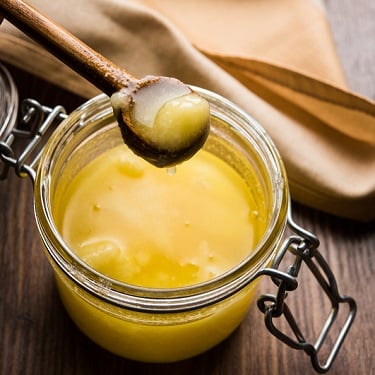How Often Should You Really Wash Your Towels?

It doesn’t matter if you have matching monogramed sets or just grab the top towel, no matter the color or condition, when you wash your hands or step out of a shower all clean and so fresh, you want to make sure your towel is clean too. But water is also a big concern. After all, according to Drought.gov, right now 48.2% of the U.S., including 57.5% of the lower 48 states are experiencing a drought, and every little drop of water counts.
So, how often should you wash your towels to make sure they’re clean but without wasting water, which is such a precious resource?
Because towels are used to remove water, after use, they’re typically damp. And that moisture can create an attractive environment for molds, yeasts, bacteria, and viruses. The dead skin cells that are transferred to the towel from your body are also a breeding ground. Yuck! Plus, the longer the towel stays wet (or damp), the more these small life forms can live and grow.
In other words, you want to give your towels the opportunity to dry as quickly as possible. Don’t just leave them in a jumble on the floor or counter. Instead, hang them up neatly—i.e., spread out—after every single use, so they can completely dry, even the folds, between each use. This one simple habit can help keep those germs at bay.
How Often Should You Wash Your Towels?
To best address this question, it’s important to look at the towel use, rather than just depend on the old “smell test.”
Bath Towels
According to surveys, 46% of folks use the same bath towel for an entire week while a surprising 9% admit to waiting a full month before theirs gets a wash. After all, they’re already clean when they step out of the shower or bath. Is that enough? Not quite.
As long as they’re hung up and allowed to dry between uses, bath towels only need to be laundered once or twice a week or after three to four uses. If your climate is more humid, especially during hot weather, you’ll want to toss your towels in the wash more often. And if your towel is still even slightly damp before your next use, grab a clean one.
Washcloths
Again, washcloths should be hung to dry between uses. They do, however, need to be washed more frequently, so make sure they hit the washer at least after every two uses or a few times per week.
Bathmats
Sure, you don’t use them to dry off, but you do walk on them throughout the day, and bathmats can see a lot of traffic from people as well as pets. Since you’re already washing your towels at least once a week, it’s also a good time to throw in your bathmat to help keep it hygienic.
BREAKING: Forget Taking Collagen, Try This 21-Second Trick for Healthier Skin & Hair Instead
Hand Towels or Tea Towels
If they’re used frequently by you, your family, your mates, and possibly guests, hand towels should be changed daily. If you live alone and use it less frequently, you can likely give it a day or two between washes, as long as you are washing your hands well.
Face Towels
Choose a soft towel, specifically made to be gentle on the face, especially to remove make up. At the minimum, replace any towels you use for your face every three days, and avoid sharing it with anyone else. If you have an acne flareup or any skin sensitivity, go ahead and go with a clean towel after every use.
No matter when your towel last came out of the wash, it’s still a good idea to give it a good whiff. If your towel smells mildewy or just “off,” go ahead and grab a fresh one. And even if you will be using a clean towel at the next use, hang your dirty towels rather than tossing them in a hamper while damp to help hinder the growth of mildew.
Towel Washing Special Circumstances
If you have any skin issues, such as toenail fungus, athlete’s foot, jock itch, or warts—which can all spread to other parts of your body—you’ll want to wash your towels after each use. The same is true if you have an eczema or dermatitis flareup, as you can spread the bacteria across the body and irritate the skin.
Likewise, if you or anyone in your house is currently sick with a cold, the flu, or another infection, you want to avoid reinfection or sharing the bacteria or virus with any housemates or family members. In that case, please just toss any towel in the wash after every use.
The same goes for towels you use at the gym—especially if they land in your gym bag to marinate in moisture (and worse) for several hours. Remove the old and replace with a fresh towel after every use.
What about sharing? If you live with a partner or spouse, towels will likely be shared—especially hand towels. This typically poses no problems—after all, you likely also share sheets too. That said, if either of you is sick or has a skin condition, this practice should be avoided until everyone is healthy again.
If you have kids, especially young children and teens, you’ll have to decide if their hygiene is good enough for you to want to share hand towels. And when it comes to washcloths, the answer is always, no: don’t share. Have separate cloths and hooks for each person.
Caring for Your Towels
Now that you’re more aware of your towel needs and habits, you may be thinking of heading to the store to replenish—especially if you’re still using the same old towels for several years and it no longer feels soft, absorbs moisture as well, or just don’t ever seem to smell fresh.
Don’t forget to wash new towels before the first use. Surprisingly, they’re often coated to make the fabric look and feel more luxurious, but the coating also makes the towel less absorbent. Plus, who knows who else has been touching your towel or if you might be sensitive to the dyes or chemicals that are on the new towel?
You may, however, be able to extend the life of your towels by starting with a higher quality towel that won’t break down as quickly, following the washing instructions on the label, and using the hottest water setting (i.e., sanitizing) on the washing machine, especially if the towel starts to develop a musty smell. To remove smells, it can also help to soak a towel in vinegar and/or hang it on a clothes line to allow the sun to bleach it and kill odors.
It’s best, though, to avoid or at least minimize the use of fabric softeners or dryer sheets as these products can clog up the loops, so your towel doesn’t dry as well and begins to break down and lose its softness over time. Instead, tumble dry it on low with a wool ball to help reduce static and stay fluffy and soft.
Big, fluffy towels are a great option for home use as they feel so soft and luxurious. Just remember that they take longer to dry, especially if you live in a more humid area.
Microfiber towels, on the other hand, can help you dry just as well, they’re more compact, and they dry faster than a big fluffy cotton towel, so they fit well into a gym bag or when traveling.
While water is a precious resource, and especially in dry areas and during a drought, every drop counts, hygiene is also important. And the last thing you want to do is rub a dirty towel all over your freshly cleaned skin.




 US Doctor: "Eating This Every Day Can Snap You Into Ketosis"
US Doctor: "Eating This Every Day Can Snap You Into Ketosis" 3 Key Nutrients to Help Lubricate Your "Tin Man" Joints
3 Key Nutrients to Help Lubricate Your "Tin Man" Joints AVOID Plant-Based Protein Powders (unless...)
AVOID Plant-Based Protein Powders (unless...)

